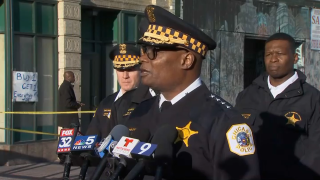
With Chicagoans on edge and a political target on his back, Chicago Police Supt. David Brown tried Friday to convince a skeptical City Council that “significant progress” is being made in the war on violent crime.
If ever there was a difficult time for Brown to be on the hot seat at City Council budget hearings, this was it.
A West Ridge community on edge after three rapid-fire murders. Wrigleyville residents and businesses demanding more police after five attempted kidnappings and armed robberies over a single weekend. A CTA system down 500,000 passengers a day from pre-pandemic levels because riders don’t feel safe. A field of mayoral challengers who have vowed to fire him.
“I’ve been here for two-and-a-half years. It feels like 10,” Brown said Friday.
Brown’s opening statement was more like an opening argument. He described “significant progress” on all fronts from solving and preventing violent crime on Chicago streets and the CTA to diversifying the ranks, improving officer morale and complying with the mandates of a federal consent decree.
“Your opening statement doesn’t remind me of the city I live in every day. … The violence spreads everywhere. Without a cohesive plan with buy-in from folks, we’re nowhere,” retiring Ald. Harry Osterman (48th) said.
“In your tenure, we have not made strides. … Communities that have had excessive violence continue to have excessive violence. … Communities like mine that have had hard-fought safety over decades have had increased violence.”
Local
Ald. Debra Silverstein (50th) amplified the argument. Her Far North Side ward includes West Ridge and a Rogers Park district where homicides are up 80%.
“I’m angry. I’m upset. And I’m grieving with the families. My community is scared,” she said.
Feeling out of the loop? We'll catch you up on the Chicago news you need to know. Sign up for the weekly> Chicago Catch-Up newsletter.
“My community is asking for more visibility. They want to see more police on the streets. … We’re on the North Side. We can’t be forgotten. We need to have police. We need to keep people safe.”
Brown responded by launching into his now-familiar tirade about electronic monitoring and lenient judges.
“What you’re angry about, we’re similarly angry because we have the highest level of officers shot at or shot by violent offenders than we’ve ever had on record. We’re not immune to this violence. And when we take these violent people off the streets, the courts— at a 500%, 600%, 700% clip — release ’em right back,” the superintendent said.
“We are doing everything we can … to do our job and it’s being undone by our courts.”
Silverstein countered, “Not all the crimes are being committed by people on electronic monitoring.”
Ald. Scott Waguespack (32nd) poked holes in Brown’s claim that CTA crime has dropped over the past two months despite a dramatic increase in the number of moonlighting officers patrolling buses and trains.
“I haven’t seen a police officer on the Blue Line. I haven’t seen a single one on platforms. …They’re not getting out of the vehicle and up on that platform. They’re not getting on a train where the specific issues are,” Waguespack said.
Black Caucus Chair Jason Ervin (28th), who represents the West Side’s Harrison District, complained about the never-ending battle against the “heroin scourge.”
“My constituents are tired — there’s no other way to put this — with the frequency. … That there is not a push toward dealing earnestly [with] the open-air drug markets. And the icing on the cake is that, in the 11th District, we only have five narcotics loitering dispersal zones in the entire district,” Ervin said.
“We’ve got to figure something out on enforcement. … I’m not asking you to be a social worker. I’m not asking you to be a mental health counselor. I’m not asking you to be a basketball coach. … I’m asking you to be the police. This is what our residents are asking for in some of these challenged communities.”
Ald. Matt O’Shea (19th), whose Far Southwest Side ward is home to scores of Chicago police officers, joined the chorus.
“In my neighborhood, people are angry. People are scared. People are tired of the carjackings, the catalytic converter thefts,” he said.
Last year, Brown’s budget hearing dragged on for nine hours. He was accused of presiding over the “most dangerous city in the country” by council members demanding that he hire more police officers — not just struggle to fill the 1,000 existing vacancies.
Since then, the wave of police retirements has turned into a stampede. Through Sept. 30 of this year, 949 officers had already retired, compared to 973 during all of last year and 625 retirements in 2020. To date, only 693 officers have begun their six months of training. As a result, the Chicago Police Department now has 11,649 sworn officers, down from 13,353 officers before Lightfoot took office.
On Friday, Brown blamed an avalanche of special events — along with specific threats against the Pride Parade — for the fact that CPD has already spent $112 million on overtime this year — $12 million over its overtime budget for the entire year.
Retiring Ald. Tom Tunney (44th) poked holes in that argument also.
“The police department has to sign off on these events. … You guys sign off on this stuff and you’re complaining,” Tunney said.
Brown replied, “We’re not party poopers. We’re not gonna say you can’t have the extra special events that we’ve had this past year. But it does require security. We’re responsible for making sure these events are safe.”



